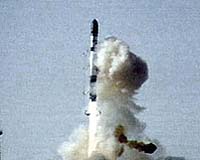Iran test fires Russian missiles near Strait of Hormuz
Iran's elite Revolutionary Guards test fired its new Russian defense missile system Wednesday near the strategically important Strait of Hormuz, state radio reported.

The two-day maneuvers are Iran's second since the United Nations Security Council approved economic sanctions against it Dec. 23, which ban selling to Iran materials and technology that it could use in its nuclear and missile programs.
As tensions rise over Iran's nuclear standoff with the West, the United States and Iran have pursued an escalating series of military moves, with Washington sending a second aircraft carrier battle group to the region and Iran responding with more frequent maneuvers.
The Revolutionary Guards' began the games Wednesday in the Persian Gulf and Oman Sea, which flank the strait, through which some 20 percent of the world's oil transits daily.
The goal of the maneuvers, dubbed Saegheh and Badr, is to improve the "defense, stamina and operation" of participating units, state radio reported. The first word of the games' name means lightening, while the second refers to a decisive battle in the early days of Islam.
The Revolutionary Guards is an elite military corps with more than 200,000 members and its own naval and air forces. It is independent of the regular armed forces and controlled directly by the supreme leader. It oversees vital interests such as oil and natural gas installations and the nation's missile arsenal.
Iran announced in January that it had received the Tor M-1 Russian air defense missile system, though it did not say when the weapons had arrived. Moscow had said previously it would supply 29 of the systems to Iran under a US$700 million (EUR 539 million) contract signed in December 2005.
Iran in January launched a three-day military maneuvers, including short-range missile tests on its mainland.
The United States and several of its Western allies believe that Iran is using the nuclear program to produce an atomic weapon charges Iran denies, saying its aim is to generate electricity, reports AP.
The U.S. military, which maintains around 200,000 troops and around four dozen ships in the region, keeps a close eye on Iran's military, U.S. military officials have said.
"It's not uncommon for us to see them saber-rattle," said Lt. Cmdr. Charlie Brown of the U.S. Navy's Fifth Fleet, based in Bahrain, just across the Gulf from Iran.
"We don't want any country to miscalculate about our commitment to stability and security here," Brown said, declining to comment on the missile tests themselves. "We hope other nations in the region wouldn't take action to harm that."
Subscribe to Pravda.Ru Telegram channel, Facebook, RSS!





